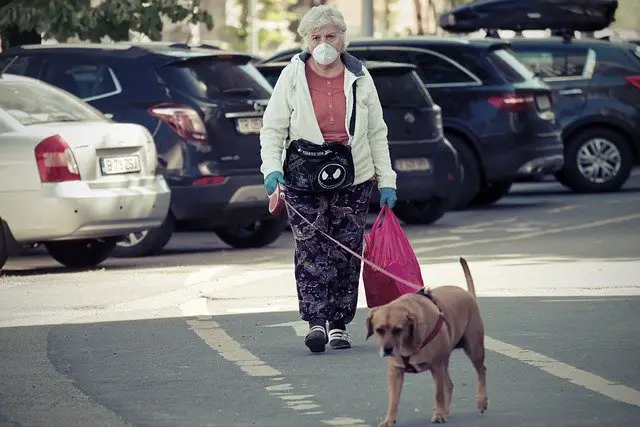Service dogs play a vital role in the well-being of individuals with disabilities or mental health conditions. But although they are often considered to be medically necessary, it’s unclear whether Medicaid will pay for a service dog’s initial costs and ongoing fees. Considering that service dogs can cost quite a bundle, anyone interested in such a dog needs to know! Let’s answer this question and more now!
What Is a Service Dog?
Let’s begin with the basics. A service dog isn’t just any canine companion that provides you with general comfort while you’re out and about. They serve specific functions. In fact, the Americans with Disability Act states that service animals are, “defined as dogs that are individually trained to do work or perform tasks for people with disabilities”.
Another way of looking at it is that a service dog is specially trained to assist the handler with something that relates to their disability. For instance, a dog that knows how to fetch can do something specific, but that isn’t normally related to disability unless stated so on the service dog application.
An example of a dog that is a service dog is a canine that guides a blind handler across the street. In this case, both the training and the service provided directly related to the disability of the handler him or herself.
What do service dogs get to do that others can’t? For starters, they can’t be denied entrance to any business, and even places where you can get food like restaurants or cafés. They can also Comodo state and local government buildings or nonprofit organizations. But on the flip side, they always have to be under control, meaning they need to be leashed and harnessed in such a way that doesn’t interfere with the dog’s duties or services.
One last caveat: service dog handlers can’t be asked about his or her disability. The only legal requests are what the dog has been trained to do in service of the handler and if the dog is a service animal in the first place.
What Does Medicaid Cover? Will it Pay for a Service Dog?

In a nutshell, Medicaid is a federal and state program that provides medical cost assistance for qualifying people that don’t have lots of income or other resources. They cover benefits that may not be covered by Medicare, but personal care services and nursing home care. Thus, it’s logical for someone to ask if Medicare will pay for a service dog.
Why It Doesn’t Cover Service Dogs
Medicaid, and indeed any health insurance, even from private companies, does not cover service animal expenses.
Put simply, Medicaid is designed to cover any absolutely necessary medical expenses that would, if not cover, result in a reduction of quality of life or life endangerment. This means that Medicaid covers things like hospital expenses, doctor visits, nursing home care, and so on. But technically speaking, service animals are not necessary to live when you can have someone else provide the services that dogs do.
It’s because of this technical loophole that Medicaid doesn’t cover service dogs under any circumstances. They also don’t cover any other type of service pet or animal.
How Much Does a Service Dog Cost?

Service dogs are expensive animals both because of their extensive training requirements and all the ongoing costs needed to keep them in tip-top condition. You not only need food and other health materials for the dog in question, but you also need to cover any recurring vet expenses like animal shots or health checkups.
With the training and these ongoing costs combined, service dogs usually cost between $15,000 and $30,000 if you want a properly certified animal. This is much more expensive than what it costs for a regular dog. In addition to the initial price, your service dog will cost you between $500 and $10,000 every year depending on the dog’s health, age, and training requirements relative to your disability.
Why So Expensive?
Because the tasks that they are often asked to undertake are more complex than regular tricks or other standard training, service dogs have to go through extensive training right after they are born for the first few months of life. In many cases, specific dog breeds, often more expensive than buying a mutt at the pound, are sought after in order to make the training process easier.
All the costs add up over time. Adoption, for instance, easily runs at about $1000 or more depending on adoption fees, licenses and the breed you select. Other costs include medical services like spaying or neutering, vaccinations, and micro-chipping so you can find the dog if they are ever lost.

Then you have to account for the cost of training, which usually costs between $10,000 and $50,000. While you can train the dog yourself, you’ll need the assistance of a certified trainer and it will take longer than if the dog was trained at a certified facility.
Then general care costs pile up over time as well. Medical costs, betting and toys, grooming items, tags, and food all raise the medical and ongoing bills for a service dog far beyond what you pay for a regular animal.
Alternatives
Is there another way to get a service dog for free? Even though Medicaid doesn’t pay for a service dog, there’s ways you can get a service animal with assistance. Especially if you are on some kind of restricted income. With all the costs understood, what are your alternatives for paying for a service dog?
Private Insurance
Like Medicaid, private insurance plans also don’t cover the costs for a service dog, like initial purchasing, training, and ongoing materials.
This being said, your medical insurance can often be extended to cover your dog’s ongoing costs, like veterinary care, supplements, and emergency services. This is similar to common pet insurance, which all responsible pet owners should already have.
You’ll have to look into your private insurance plans and policy to determine whether you can obtain ongoing coverage for your service animal via the same provider or if you need to switch providers.
The VA
Many veterans may seek out the assistance of service dogs. They can remind veterans to take prescribed medications or help them get through PTSD symptoms, like an anxiety attack.
Thus, some VA service dogs may qualify for health benefits through the U.S. Department of Veterans Affairs Mental Health Mobility Service Dog Initiative. Note that only dogs that assist with both mobility limitations and mental health disorders may qualify for these benefits.
In total, this initiative provides coverage for the canine’s health and wellness costs, as well as prescription medications that might be necessary for the dog to perform its duties. Veterans can visit a VA mental health provider and apply for the benefit. This essentially covers all or most of the ongoing costs for your service dog.

However, this doesn’t cover the initial purchasing or training costs you will need to be pay via another method.
Furthermore, the VA Prosthetics and Sensory Aids Service will provide veterans with working service dogs coverage for veterinary care and equipment. This benefit does not cover the initial payment for the dog, grooming, food or other routine expenses.
The VA does provide other benefits to veterans enrolled in the above insurance program. Programs like travel expenses associated with obtaining the dog, guaranteed coverage for all treatments for the dog, and hardware expenses related to dog equipment.
Grants
The Assistance Dogs International organization and other nonprofit grants may help those with disabilities find service dogs for free or for very small fees.
Personal Loans
If you need help paying for a service dog, you can also always take out personal loans up to $50,000 to cover the initial costs of obtaining a service dog. Then you can rely on the other insurance or benefits plans described above to cover the ongoing expenses.
Flexible Spending Account
Some insurance policies allow you to use a flexible spending account to buy a service dog. This requires a letter of medical necessity from your doctor. In a nutshell, this type of spending account lets you use your salary before taxes are taken out, which will result in a cheaper overall purchase then you would have to withstand otherwise.
Nonprofits for Autism
If your dog is related to autistic disabilities, there are many organizations that may help you obtain and keep a service dog by paying for initial and ongoing costs. These organizations are nonprofits like Can Do Canines, Dogs for Better Lives, and Canine Companions for Independence.
Note: Any of the grants or secondary options often have long waitlists, so you’ll need to apply early. You can’t always rely on your application being fulfilled in lieu of someone else’s.
Conclusion
In the end, it’s a huge bummer that Medicaid doesn’t pay for service dogs. This means people who need a service dog will have to try harder to get it covered or pay out-of-pocket. How have you managed to pay for a service dog? Do you have any tips for those looking to get coverage? Let us know and start a conversation!


